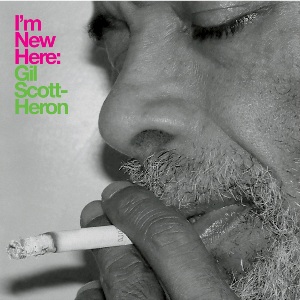Well, this is a nice surprise. The great Gil Scott-Heron, author of classics such as “The Revolution Will Not Be Televised,” “Johannesburg,” and “The Bottle,” has had a well-chronicled bout with drugs in recent years, and eventually served a few stints in prison for possession. I think that most of us have written him off as a result, but thankfully he has rebounded with new art.
I’m New Here, set for release via Beggars Group on February 9, is Scott-Heron’s first album since 1994’s Spirits. Production — or, more accurately, spare musical backdrops — are lovingly provided by Beggars Group president Richard Russell. No Brian Jackson, though.
More from the bio:
On much of I’m New Here, Scott-Heron reflects on his life and this moment with his trademark vocal power and insight, sharing his visions among Russell’s flickering, electronic soundscapes which at various times conjure up thoughts of Burial and The xx, as well as a host of hip-hop influenced sounds. Against the low, buzzing miasma of “Crutch,†Scott-Heron observes a sidewalk junkie from both inside the addict’s head and out: “His eyes half-closed reveal his world of nod/A world of lonely men and no love, no God…†Against the metallic pulse of “Running,†he narrates a cold-sweat, 3 a.m. epiphany: “Because it’s easier to run/Easier than staying and finding out you’re the only one/Who didn’t run.†And, on the blues holler of future single “New York City is Killing Me,†he manages to sound like a raw-throated blues singer from a ‘30’s field recording and an existential narrator trapped in some post-industrial wasteland. Occasionally the electronics are stripped right back – as they are on the beautiful, heartfelt “I’ll Take Care Of You†– or on “I’m New Hereâ€, a cover of indieband Smog, of all things, where Scott-Heron’s weathered baritone completely owns the lyrics, transforming them with the force of own history. At other times in stark contrast, they’re ramped right up – just listen to the crashing, hip-hop beat and primal vocal boom of “Me And The Devilâ€. Elsewhere, along with brief ruminations and tape-recorded insights, Scott-Heron sings over the airy, funk arrangements that recall his ‘70s work, given a modern day reboot by Russell. But through all of it runs the thoughtful, provocative and still rebellious voice of Gil Scott-Heron.
Long after bringing the ‘90s British rave scene into global fame with The Prodigy, XL head Richard Russell has become arguably the most groundbreaking independent force in the music industry, releasing records by everyone from The White Stripes, to M.I.A. to Devendra Banhart, Vampire Weekend, Dizzee Rascal and Radiohead. Connect those dots and you get a good sense of why Russell first made contact with Gil Scott-Heron In Rikers Islands Prison Facility in June 2006 with the proposal of making a new album together. Russell has been an occasional artist and producer throughout his time as a label head and the possibility of collaborating musically with a personal hero was too exciting to ignore. It would turn out be an ideal fit for Scott-Heron too, as an artist who has remained consistently relevant throughout his life and lately, almost too much so. He now looks out on an America much like the one he saw in the Nixon-Reagan eras, only with the
volume cranked. The 2000 election victory was a cartoon of Reagan’s pseudo-populist triumph in 1980 (which then prompted Scott-Heron’s song “B Movie.â€) The economic meltdown is a disaster-film ‘70s recession. Iraq is a crack-buzzed Vietnam. The revolution will be streamed.But on I’m New Here, which was started in 2007 but mostly recorded in New York over the last twelve months, Scott-Heron speaks less as prophet of doom than as the empathic social portraitist of ‘70 songs like “Peace Go With You Brother,†or “Your Daddy Loves You.†On “I’m New Here,†or “On Coming From a Broken Home,†you hear the huge, banged-up heart that shows the only genuine motivation any activist or artist should have, a bone-deep, unsentimental love for humanity. “If I hadn’t been as eccentric as obnoxious as arrogant as aggressive as disrespectful as selfish, I wouldn’t be me,†he says, on one brief interlude. “I wouldn’t be who I am.â€
And who is exactly is that? Is Gil Scott-Heron – as they’ve said about everyone from the Last Poets to Lou Reed – the founding father of rap? Not at all. Just the smart rap. Just the soulful, socially aware, verbally dexterous style of artists like Public Enemy, Mos Def, and Kanye West, who, born in 1977 and raised by an English prof mom, probably heard Gil Scott-Heron before he heard the Sugar Hill Gang and later, like countless other rappers, sampled him. (Scott-Heron returns the favor by borrowing some from West’s “Flashing Lights†for the misty backdrop to “On Coming From a Broken Home.â€) But this songwriter is also well represented in the sharp, honest songwriters in today’s indie- and folk-rock margins and there’s the slightly ominous possibility, hinted at in the second chorus of “I’m New Here,†that Gil Scott-Heron now, after a 40-year-career, may be hipper than any of them: “Turn around, turn around, turn around,†he gently sings. “You may come full circle/And be new here/Again.â€
Here’s the track listing:
- 1. “On Coming From A Broken Home”
- 2. “Me And The Devil”
- 3. “I’m New Here”
- 4. “Your Soul And Mine”
- 5. “Parents (Interlude)”
- 6. “I’ll Take Care Of You”
- 7. “Being Blessed (Interlude)”
- 8. “Where Did The Night Go”
- 9. “I Was Guided (Interlude)”
- 10. “New York Is Killing Me”
- 11. “Certain Things (Interlude)”
- 12. “Running”
- 13. “The Crutch”
- 14. “I’ve Been Me (Interlude)”
- 15. “On Coming From A Broken Home (Part 2)”


